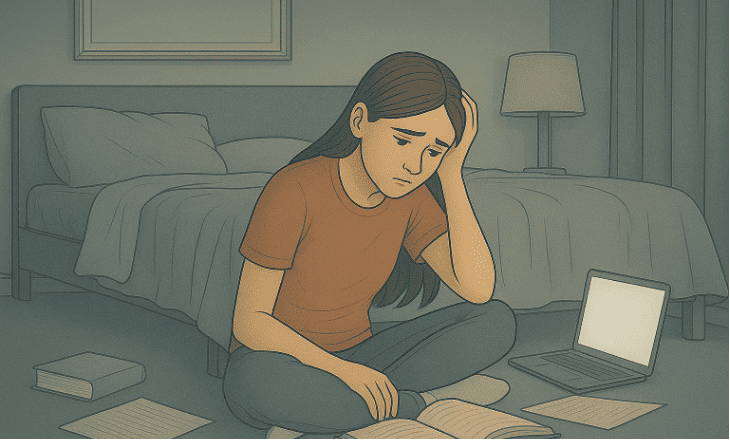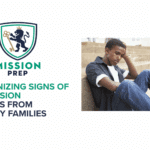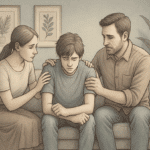Key Takeaways
- Teen depression is rising sharply, with traditional treatments often insufficient; early, effective, and age-appropriate interventions are critical.
- Antidepressants carry safety concerns, cause side effects, and may take weeks to work, leaving many teens with inadequate relief from depressive symptoms.
- TMS has a non-medication, targeted approach that stimulates mood-regulating brain circuits, improving energy, motivation, and social engagement.
- TMS is safe for adolescent brains, with mild, temporary side effects and no long-term impacts on cognitive function or neurological development; it works best when combined with therapy, lifestyle changes, and supportive family involvement.
- Mission Prep provides teen-focused, family-centered mental health care, including TMS, through residential, outpatient, and telehealth programs, giving adolescents structured, supportive environments for sustainable recovery.
Teen Depression Crisis: Why Traditional Treatments Often Fall Short
Teen mental health is in crisis. Around 20% of adolescents experience depression before adulthood, with rates rising steadily over the past decade and accelerating during and after the pandemic. Parents and healthcare providers face a growing challenge in finding effective interventions.
Rising Rates of Teen Depression
Depression among teens has surged nearly 60% since 2007. Social media pressures, academic stress, family problems, biological factors, and global uncertainties combine to create a mental health storm. Alarmingly, suicide is now the second leading cause of death among those aged 10–24 in the United States, underscoring the urgent need for targeted treatments.
Limitations of Antidepressants for Adolescents
Medications present unique challenges for teens. Antidepressants carry an FDA black box warning for increased suicidal thoughts, have variable effectiveness in developing brains, and often cause side effects like weight gain, sleep disruption, and emotional numbness. Many adolescents show minimal response to their first antidepressant. Key concerns include:
- Lower efficacy compared to adults
- Side effects impacting development and social life
- Adherence difficulties in teens
- Long-term brain development implications
- Delayed therapeutic effects (4–6 weeks)
When Therapy Alone Isn’t Enough
Psychotherapy, particularly CBT, is a frontline treatment, but weekly sessions may be insufficient for moderate to severe depression. Neurobiological factors and provider shortages make specialized care hard to access. Teens with treatment-resistant depression often endure prolonged suffering affecting education, social life, and family relationships, leaving many families with limited options to help their teen regain stability.
Mission Prep Healthcare specializes in mental health treatment for teens aged 12-17, offering residential and outpatient programs for anxiety, depression, trauma, and mood disorders. Our therapies include CBT, DBT, EMDR, and TMS, tailored to each adolescent’s needs.
With a structured, supportive environment, we integrate academic support and family involvement to promote lasting recovery. Our goal is to help teens build resilience and regain confidence in their future.
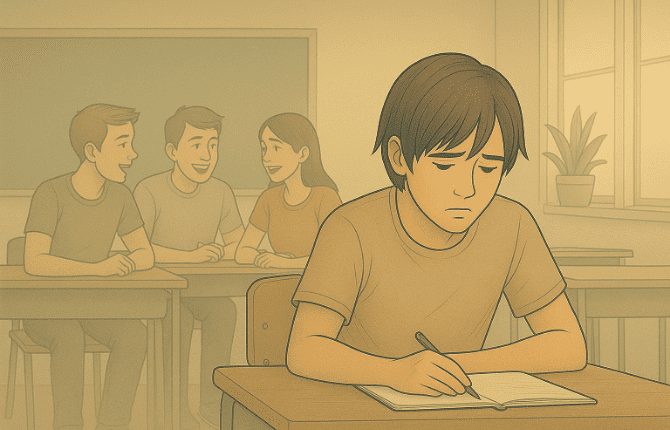
Academic pressure and social media can amplify stress, contributing to depressive symptoms in teens.
What Is TMS and How Does It Work for Depression?
Transcranial Magnetic Stimulation (TMS) has a unique approach to depression treatment. Instead of altering brain chemistry with medication, TMS directly stimulates neural circuits that regulate mood, making it valuable for adolescents who don’t respond to traditional treatments or cannot tolerate medication side effects.
The Science Behind TMS
TMS generates magnetic pulses that pass through the skull to activate neurons in targeted brain regions. The primary focus is the dorsolateral prefrontal cortex (DLPFC), often underactive in depression. Repeated stimulation across sessions helps normalize activity in mood-regulating networks. A 2019 study found TMS led to clinically meaningful changes in depressive symptoms in adolescents with treatment-resistant depression.
During adolescence, the prefrontal cortex undergoes critical remodeling, and TMS can take advantage of this neuroplasticity to promote healthier neural pathways. Modern TMS precisely targets affected circuits without impacting surrounding tissue.
How TMS Differs from Medication and Other Treatments
Unlike antidepressants that affect the whole brain, TMS is targeted, reducing systemic side effects. Unlike ECT, it doesn’t require anesthesia, cause seizures, or impair memory, allowing teens to continue school and daily activities. Results can appear within 2–3 weeks, faster than the typical 4–6 week medication timeline, which is crucial for minimizing disruption during formative years.
What Happens During a Typical TMS Session
Sessions are specific to adolescent needs. The provider locates the precise coil placement and motor threshold for each teen. Treatments last 20–40 minutes, with teens sitting comfortably while the coil delivers rhythmic pulses to the prefrontal cortex. Most report the sensation as unusual but not painful, and they quickly adapt.
The Evidence: Does TMS Really Help Depressed Teens?
Research on TMS for adolescent depression is growing, showing promising results similar to those in adults. While studies are fewer, multiple investigations demonstrate safety and effectiveness specifically in teens.
Clinical Study Results
A large real-world study of adolescents and young adults found that TMS led to meaningful improvement in depressive symptoms, with around 70% reporting benefits and a clear dose-response effect over the course of treatment
Comparisons to Traditional Treatments
TMS may offer advantages for adolescents who don’t respond to medication. The STAR*D study showed that each failed medication trial reduces the chance of subsequent response, whereas TMS remains effective even in treatment-resistant cases. Response rates for TMS are comparable or superior to SSRIs, with fewer side effects and better tolerance in teens.
Real Patient Outcomes
TMS can meaningfully improve quality of life. Teens often experience restored motivation, energy, and engagement in school, hobbies, and family life, sometimes before their mood fully stabilizes. These improvements support active participation in recovery through therapy and healthy lifestyle changes, helping adolescents break free from depressive inertia.
Safety Profile of TMS for Teenage Brains
Safety is a top priority when treating adolescents. TMS has shown an excellent safety record in teens, with no negative effects on cognitive function, brain development, or long-term neurological health.
Common Side Effects
Side effects are generally mild and temporary, similar to adults:
- Scalp discomfort or mild headache (usually resolves within 24 hours)
- Temporary fatigue after initial sessions
- Occasional lightheadedness or difficulty sleeping
These effects often ease as teens adjust, and over-the-counter pain relievers or scheduling adjustments can help. Unlike medications, TMS avoids weight gain, sexual dysfunction, emotional blunting, or gastrointestinal issues, supporting better adherence and completion of therapy.
Finding Qualified Providers
Choose a provider experienced in adolescent TMS. Ideally, a child/adolescent psychiatrist works alongside the TMS team to tailor treatment. Ask about their experience with teenage patients, age-specific protocols, and outcomes to ensure safe, effective care.
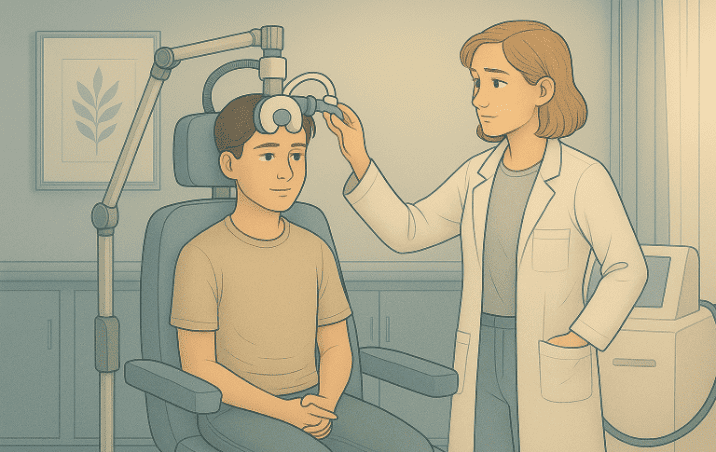
TMS targets specific brain circuits to improve mood without systemic medication side effects.
What Parents Need to Know Before Starting TMS
Deciding on TMS for your teen requires understanding the science, practical logistics, and setting realistic expectations. Time, costs, and coordination with therapy or medication should be planned in advance. Open communication with your teen and the treatment team supports better outcomes.
Supporting Your Teen
Parental support is vital. Create a comfortable routine around sessions and acknowledge the commitment your teen is making. Be attentive to subtle mood changes and maintain privacy while avoiding stigmatizing language, as teens may feel embarrassed or worry about peer perceptions.
Combining TMS with Other Therapies
TMS is most effective as part of a comprehensive approach. Continuing psychotherapy during TMS enhances engagement, while therapy provides coping strategies to extend benefits. Some teens may continue or adjust medication under supervision, and lifestyle factors like exercise, sleep, and nutrition further improve outcomes.
Setting Realistic Expectations
TMS works gradually. Many adolescents notice improved energy first, followed by sleep, motivation, and mood over several weeks. Benefits often continue after treatment ends, lasting 6–12 months, though some may need maintenance sessions.
- Improvement typically begins weeks 2–4
- Energy and motivation often improve before mood
- Partial response can still enhance the quality of life and therapy engagement
Mission Prep: Innovative, Family-Centered Teen Mental Health Care
Mission Prep offers specialized care for adolescents aged 12–17 struggling with depression, anxiety, trauma, mood disorders, or technology dependence. Our programs complement innovative treatments like TMS, providing teens with structured, safe, and supportive environments.

Mission Prep combines academic support with therapy so teens stay on track while healing.
Tailored Care for Teens
Treatment is personalized and age-appropriate, combining evidence-based therapies such as CBT, DBT, EMDR, and TMS with academic support and family involvement. This ensures teens receive holistic care addressing both mental health and developmental needs.
Comprehensive Levels of Care
Mission Prep provides residential, outpatient, and telehealth programs. Teens can receive 24-hour residential care in calm, home-like settings, or continue recovery through outpatient and virtual programs while reintegrating into school and daily life.
Family-Focused Model
Families are actively included through weekly therapy, consistent communication, and structured transition planning. Involving the entire family system helps reinforce treatment gains and supports lasting recovery.
Home-Like, Supportive Environments
Licensed group homes provide semi-private rooms, shared meals, and nurturing spaces. Teens build coping skills and resilience while practicing strategies in a safe, structured environment.
Why Choose Mission Prep
By combining innovative treatments like TMS with evidence-based therapy, academic support, and family-centered care, Mission Prep prepares teens for life’s challenges and supports sustainable mental health improvements.
Frequently Asked Questions (FAQs)
Will TMS interfere with my teen’s daily activities?
Most teens can continue school, sports, and hobbies during TMS. Sessions last 20–40 minutes, and side effects are usually mild. Concentration and energy are rarely affected, allowing daily routines to continue uninterrupted throughout treatment.
How quickly will my teen notice changes?
Subtle improvements in energy, motivation, and sleep often appear within 2–3 weeks. Mood changes typically follow by weeks 3–5, with full benefits emerging over the complete 6–8 week course. Progress may continue even after treatment concludes.
How is the treatment customized for teenagers?
Each teen’s motor threshold is measured, and coil placement, intensity, and session duration are adjusted to match their unique brain physiology. This personalization ensures the treatment is safe, effective, and specific to the adolescent’s needs.
Are there any risks to brain development?
Research indicates TMS does not harm adolescent brain development, cognitive function, or long-term neurological health. It is considered a safe alternative to medications that can have broader systemic side effects, making it suitable for teens.
What options are available if my teen needs additional support beyond TMS?
If TMS helps but your teen still struggles with depression, anxiety, or other mental health challenges, specialized adolescent programs can provide comprehensive care. Facilities like Mission Prep offer residential, outpatient, and telehealth programs combining therapy, academic support, and family involvement to help teens build long-term resilience and recovery.


